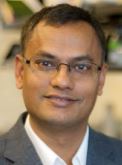Date
Location
Research 1: R1-101
Description
Human genome contains more than 3 billion base pairs of DNA, which are packaged in the form of chromatin. Human genome encodes about 20,000 protein-coding genes, which occupies only ~1.5 % of the whole genome. Rest of the genome were mostly considered as non-functional or “Junk” DNA. Recent studies demonstrate that most of the human genome is functional. Along with protein coding genes, it encodes many noncoding RNAs (ncRNA) that are transcribed, but mostly never get translated into proteins. NcRNAs, though not translated, appear to play critical roles in various cellular and physiological pathways and are misregulated in diseases. In my lab, we study, role of chromatin modifications and long noncoding RNA (lncRNA) in gene expression, epigenetics, and diseases. Here, I will present functions of mixed lineage leukemia (MLL) family of histone methyl-transferases and lncRNAs in human gene expression, steroid signaling, inflammation, cancer, cardiovascular disease, and neurological disorders. I will also discuss how chromatin modifying enzymes and ncRNAs may be targeted towards development of effective diagnosis and therapeutics.
Biography: Dr. Subhrangsu Mandal is an Associate Professor of Biochemistry at the University of Texas at Arlington. He received PhD in Organic Chemistry from the Indian Institute of Science, Bangalore. He completed his postdoctoral studies at the University of Alberta (with Dr. Reha-Krantz) and then University of Medicine and Dentistry of New Jersey (with Dr. Reinberg, Howard Hughes Medical Institute) in the field of Biochemistry of human gene expression and regulation. He joined the University of Texas at Arlington as an Assistant Professor of Biochemistry in fall 2005. Dr. Mandal’s major research interests are: Mechanism of human gene regulation, steroid signaling, epigenetics, and disease. In particular, Mandal lab is studying the functions of chromatin modifying enzymes and noncoding RNAs in human gene regulation, inflammation, cancer, cardiovascular and neurological disorders. Being an organic chemist, he is also interested in medicinal chemistry and drug discovery.
Presenter

Subhrangsu Mandal
Department of Chemistry and Biochemistry
University of Texas at Arlington
Contact
Swadesh Santra, Ph.D. NanoScience Technology Center Swadeshmukul.Santra@ucf.edu